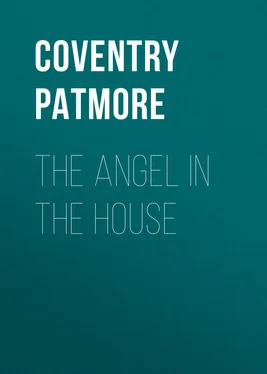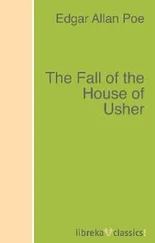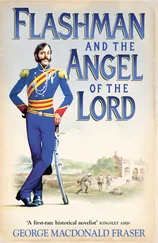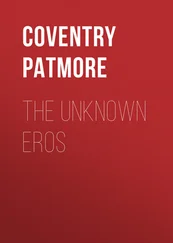Coventry Patmore - The Angel in the House
Здесь есть возможность читать онлайн «Coventry Patmore - The Angel in the House» — ознакомительный отрывок электронной книги совершенно бесплатно, а после прочтения отрывка купить полную версию. В некоторых случаях можно слушать аудио, скачать через торрент в формате fb2 и присутствует краткое содержание. Жанр: foreign_poetry, literature_19, Поэзия, foreign_antique, foreign_prose, на английском языке. Описание произведения, (предисловие) а так же отзывы посетителей доступны на портале библиотеки ЛибКат.
- Название:The Angel in the House
- Автор:
- Жанр:
- Год:неизвестен
- ISBN:нет данных
- Рейтинг книги:3 / 5. Голосов: 1
-
Избранное:Добавить в избранное
- Отзывы:
-
Ваша оценка:
- 60
- 1
- 2
- 3
- 4
- 5
The Angel in the House: краткое содержание, описание и аннотация
Предлагаем к чтению аннотацию, описание, краткое содержание или предисловие (зависит от того, что написал сам автор книги «The Angel in the House»). Если вы не нашли необходимую информацию о книге — напишите в комментариях, мы постараемся отыскать её.
The Angel in the House — читать онлайн ознакомительный отрывок
Ниже представлен текст книги, разбитый по страницам. Система сохранения места последней прочитанной страницы, позволяет с удобством читать онлайн бесплатно книгу «The Angel in the House», без необходимости каждый раз заново искать на чём Вы остановились. Поставьте закладку, и сможете в любой момент перейти на страницу, на которой закончили чтение.
Интервал:
Закладка:
She from a rose-tree shook the blight;
And well she knew that I knew well
Her grace with silence to requite;
And, answering now the luncheon bell,
I laugh’d at Mildred’s laugh, which made
All melancholy wrong, its mood
Such sweet self-confidence display’d,
So glad a sense of present good.
I laugh’d and sigh’d: for I confess
I never went to Ball, or Fête,
Or Show, but in pursuit express
Of my predestinated mate;
And thus to me, who had in sight
The happy chance upon the cards,
Each beauty blossom’d in the light
Of tender personal regards;
And, in the records of my breast,
Red-letter’d, eminently fair,
Stood sixteen, who, beyond the rest,
By turns till then had been my care:
At Berlin three, one at St. Cloud,
At Chatteris, near Cambridge, one,
At Ely four, in London two,
Two at Bowness, in Paris none,
And, last and best, in Sarum three;
But dearest of the whole fair troop,
In judgment of the moment, she
Whose daisy eyes had learn’d to droop.
Her very faults my fancy fired;
My loving will, so thwarted, grew;
And, bent on worship, I admired
Whate’er she was, with partial view.
And yet when, as to-day, her smile
Was prettiest, I could not but note
Honoria, less admired the while,
Was lovelier, though from love remote.
CANTO III
Honoria
PRELUDES
He meets, by heavenly chance express,
The destined maid; some hidden hand
Unveils to him that loveliness
Which others cannot understand.
His merits in her presence grow,
To match the promise in her eyes,
And round her happy footsteps blow
The authentic airs of Paradise.
For joy of her he cannot sleep;
Her beauty haunts him all the night;
It melts his heart, it makes him weep
For wonder, worship, and delight.
O, paradox of love, he longs,
Most humble when he most aspires,
To suffer scorn and cruel wrongs
From her he honours and desires.
Her graces make him rich, and ask
No guerdon; this imperial style
Affronts him; he disdains to bask,
The pensioner of her priceless smile.
He prays for some hard thing to do,
Some work of fame and labour immense,
To stretch the languid bulk and thew
Of love’s fresh-born magnipotence.
No smallest boon were bought too dear,
Though barter’d for his love-sick life;
Yet trusts he, with undaunted cheer,
To vanquish heaven, and call her Wife
He notes how queens of sweetness still
Neglect their crowns, and stoop to mate;
How, self-consign’d with lavish will,
They ask but love proportionate;
How swift pursuit by small degrees,
Love’s tactic, works like miracle;
How valour, clothed in courtesies,
Brings down the haughtiest citadel;
And therefore, though he merits not
To kiss the braid upon her skirt,
His hope, discouraged ne’er a jot,
Out-soars all possible desert.
Strong passions mean weak will, and he
Who truly knows the strength and bliss
Which are in love, will own with me
No passion but a virtue ’tis.
Few hear my word; it soars above
The subtlest senses of the swarm
Of wretched things which know not love,
Their Psyche still a wingless worm.
Ice-cold seems heaven’s noble glow
To spirits whose vital heat is hell;
And to corrupt hearts even so
The songs I sing, the tale I tell.
These cannot see the robes of white
In which I sing of love. Alack,
But darkness shows in heavenly light,
Though whiteness, in the dark, is black!
You love? That’s high as you shall go;
For ’tis as true as Gospel text,
Not noble then is never so,
Either in this world or the next.
HONORIA
Grown weary with a week’s exile
From those fair friends, I rode to see
The church-restorings; lounged awhile,
And met the Dean; was ask’d to tea,
And found their cousin, Frederick Graham
At Honor’s side. Was I concern’d,
If, when she sang, his colour came,
That mine, as with a buffet, burn’d?
A man to please a girl! thought I,
Retorting his forced smiles, the shrouds
Of wrath, so hid as she was by,
Sweet moon between her lighted clouds!
Whether this Cousin was the cause
I know not, but I seem’d to see,
The first time then, how fair she was,
How much the fairest of the three.
Each stopp’d to let the other go;
But, time-bound, he arose the first.
Stay’d he in Sarum long? If so
I hoped to see him at the Hurst.
No: he had call’d here, on his way
To Portsmouth, where the Arrogant,
His ship, was; he should leave next day,
For two years’ cruise in the Levant.
Had love in her yet struck its germs?
I watch’d. Her farewell show’d me plain
She loved, on the majestic terms
That she should not be loved again;
And so her cousin, parting, felt.
Hope in his voice and eye was dead.
Compassion did my malice melt;
Then went I home to a restless bed.
I, who admired her too, could see
His infinite remorse at this
Great mystery, that she should be
So beautiful, yet not be his,
And, pitying, long’d to plead his part;
But scarce could tell, so strange my whim,
Whether the weight upon my heart
Was sorrow for myself or him.
She was all mildness; yet ’twas writ
In all her grace, most legibly,
‘He that’s for heaven itself unfit,
Let him not hope to merit me.’
And such a challenge, quite apart
From thoughts of love, humbled, and thus
To sweet repentance moved my heart,
And made me more magnanimous,
And led me to review my life,
Inquiring where in aught the least,
If question were of her for wife,
Ill might be mended, hope increas’d.
Not that I soar’d so far above
Myself, as this great hope to dare;
And yet I well foresaw that love
Might hope where reason must despair;
And, half-resenting the sweet pride
Which would not ask me to admire,
‘Oh,’ to my secret heart I sigh’d,
‘That I were worthy to desire!’
As drowsiness my brain reliev’d,
A shrill defiance of all to arms,
Shriek’d by the stable-cock, receiv’d
An angry answer from three farms.
And, then, I dream’d that I, her knight,
A clarion’s haughty pathos heard,
And rode securely to the fight,
Cased in the scarf she had conferr’d;
And there, the bristling lists behind,
Saw many, and vanquish’d all I saw
Of her unnumber’d cousin-kind,
In Navy, Army, Church, and Law;
Smitten, the warriors somehow turn’d
To Sarum choristers, whose song,
Mix’d with celestial sorrow, yearn’d
With joy no memory can prolong;
And phantasms as absurd and sweet
Merged each in each in endless chace,
And everywhere I seem’d to meet
The haunting fairness of her face.
CANTO IV
The Morning Call
PRELUDES
Lo, when the Lord made North and South
And sun and moon ordained, He,
Forthbringing each by word of mouth
In order of its dignity,
Did man from the crude clay express
By sequence, and, all else decreed,
He form’d the woman; nor might less
Than Sabbath such a work succeed.
And still with favour singled out,
Marr’d less than man by mortal fall,
Her disposition is devout,
Her countenance angelical;
The best things that the best believe
Are in her face so kindly writ
The faithless, seeing her, conceive
Not only heaven, but hope of it;
No idle thought her instinct shrouds,
But fancy chequers settled sense,
Like alteration of the clouds
On noonday’s azure permanence;
Pure dignity, composure, ease
Declare affections nobly fix’d,
And impulse sprung from due degrees
Of sense and spirit sweetly mix’d.
Her modesty, her chiefest grace,
The cestus clasping Venus’ side,
How potent to deject the face
Of him who would affront its pride!
Wrong dares not in her presence speak,
Nor spotted thought its taint disclose
Under the protest of a cheek
Outbragging Nature’s boast the rose.
In mind and manners how discreet;
How artless in her very art;
How candid in discourse; how sweet
The concord of her lips and heart;
How simple and how circumspect;
How subtle and how fancy-free;
Though sacred to her love, how deck’d
With unexclusive courtesy;
How quick in talk to see from far
The way to vanquish or evade;
How able her persuasions are
To prove, her reasons to persuade;
How (not to call true instinct’s bent
And woman’s very nature, harm),
How amiable and innocent
Her pleasure in her power to charm;
How humbly careful to attract,
Though crown’d with all the soul desires,
Connubial aptitude exact,
Diversity that never tires.
Интервал:
Закладка:
Похожие книги на «The Angel in the House»
Представляем Вашему вниманию похожие книги на «The Angel in the House» списком для выбора. Мы отобрали схожую по названию и смыслу литературу в надежде предоставить читателям больше вариантов отыскать новые, интересные, ещё непрочитанные произведения.
Обсуждение, отзывы о книге «The Angel in the House» и просто собственные мнения читателей. Оставьте ваши комментарии, напишите, что Вы думаете о произведении, его смысле или главных героях. Укажите что конкретно понравилось, а что нет, и почему Вы так считаете.











